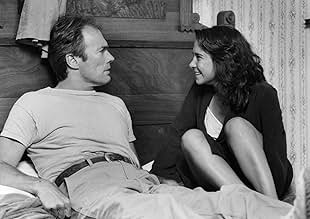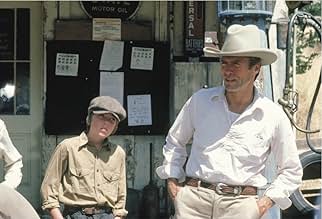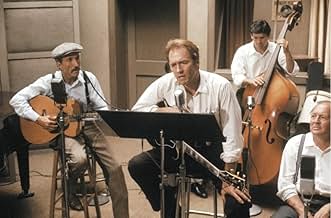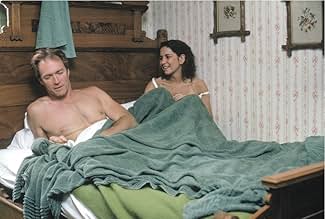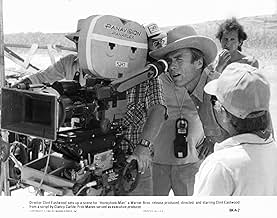Honkytonk Man
- 1982
- Tous publics
- 2h 2min
NOTE IMDb
6,6/10
10 k
MA NOTE
Red, musicien ambulant, retourne à la ferme familiale en Oklahoma et y retrouve un paysage dévasté par un ouragan. Il est gravement malade et pourtant, une dernière chance s'offre à lui. Une... Tout lireRed, musicien ambulant, retourne à la ferme familiale en Oklahoma et y retrouve un paysage dévasté par un ouragan. Il est gravement malade et pourtant, une dernière chance s'offre à lui. Une convocation pour une audition à Nashville.Red, musicien ambulant, retourne à la ferme familiale en Oklahoma et y retrouve un paysage dévasté par un ouragan. Il est gravement malade et pourtant, une dernière chance s'offre à lui. Une convocation pour une audition à Nashville.
- Réalisation
- Scénario
- Casting principal
- Récompenses
- 1 nomination au total
Avis à la une
...and for that matter any human being.
Clint Eastwood's little masterpiece is filled with insights of human
nature and our dreams and how futile but nonetheless honorable
they are in most cases.
Watch out for many keys to understand low(er) class white Americans
and how music is one of the very best ways to bring them together
with, or at least closer to, African Americans. Without gospel, blues
and jazz - three styles developed by black people in the US during
the early 20th century - there would (arguably) be no country music and of
course no pop music (as it is today).
I am a musician and this little masterpiece certainly means a lot to
me and my colleagues all over the world.
This movie definitely is a metaphor of life and Clint Eastwood uses his second passion after cinema, music, as the
base but it contains so much more deep philosophy and homage
that I do not hesitate calling it a small masterpiece.
IMHO Honkytonk Man is for Clint Eastwood what Little Man Tate
(1991) is for Jodie Foster - only better, much better. Just think
about the fact that Clint went back (explained in a monologue) for
his skinny girl. After all he did love her.
It takes cojones to make a movie like that. Great work Mr.
Eastwood.
Clint Eastwood's little masterpiece is filled with insights of human
nature and our dreams and how futile but nonetheless honorable
they are in most cases.
Watch out for many keys to understand low(er) class white Americans
and how music is one of the very best ways to bring them together
with, or at least closer to, African Americans. Without gospel, blues
and jazz - three styles developed by black people in the US during
the early 20th century - there would (arguably) be no country music and of
course no pop music (as it is today).
I am a musician and this little masterpiece certainly means a lot to
me and my colleagues all over the world.
This movie definitely is a metaphor of life and Clint Eastwood uses his second passion after cinema, music, as the
base but it contains so much more deep philosophy and homage
that I do not hesitate calling it a small masterpiece.
IMHO Honkytonk Man is for Clint Eastwood what Little Man Tate
(1991) is for Jodie Foster - only better, much better. Just think
about the fact that Clint went back (explained in a monologue) for
his skinny girl. After all he did love her.
It takes cojones to make a movie like that. Great work Mr.
Eastwood.
An under appreciated 80s effort (being Eastwood's ninth stint directing a major feature), which rarely gets a mention and if so it mainly gets a "meh". This Clint Eastwood directed/performed feature 'Honkytonk Man' shows much more a vulnerable Eastwood in a very dramatic role (of an aging, alcoholic drifting country singer) that asked a lot from him. Set during the period of the great depression that ravaged the 1930s, Eastwood manages to capture the authentic atmosphere and dusty locations of the times with Bruce Surtees's earthy photography and his very-grounded direction, but also letting the harshness move over for some very sentimental openings that never manipulate the situations. There's a real homegrown feel, mixing elements of a coming of age story to someone longing to be somebody and this is all coming together to learn not to take everything on face-value. We watch two people, fulfilling a dream as it ignites the passion leaving to a series of adventures and an insightful script exploring the interactions.
It's an inspired turn by Eastwood, but his son Kyle Eastwood is just as impressive in a sincerely down-to-earth performance as the young lad Whit, the 14 year old nephew that makes sure that he gets his uncle to the Gran Ole Opry stage to do his thing albeit trying to keep him sober to perform. Along for the journey you'll find the likes of John McIntire, Alexa Kenin, Tim Thomerson, Barry Corbin, Macon McCalman, Joe Regalbuto and Charles Cyphers making up a splendidly admirable cast. A very heart-warming Verna Bloom and sturdy Matt Clark do leave their marks as Whit's worrying parents. While rather long, the chemistry makes sure the story marvelously flows and the relax temperament lets the emotional factor seep in. I don't know, but I found it hard not to like. The score is a perfectly delightful country twang featuring numerous names in Marty Robbins, Frizzel and West, Ray Price, Linda Hopkins and supervised by Snuff Garrett. Let's not forget Eastwood himself adding to the arrangement.
A wonderfully brassy and enterprising Eastwood fable.
It's an inspired turn by Eastwood, but his son Kyle Eastwood is just as impressive in a sincerely down-to-earth performance as the young lad Whit, the 14 year old nephew that makes sure that he gets his uncle to the Gran Ole Opry stage to do his thing albeit trying to keep him sober to perform. Along for the journey you'll find the likes of John McIntire, Alexa Kenin, Tim Thomerson, Barry Corbin, Macon McCalman, Joe Regalbuto and Charles Cyphers making up a splendidly admirable cast. A very heart-warming Verna Bloom and sturdy Matt Clark do leave their marks as Whit's worrying parents. While rather long, the chemistry makes sure the story marvelously flows and the relax temperament lets the emotional factor seep in. I don't know, but I found it hard not to like. The score is a perfectly delightful country twang featuring numerous names in Marty Robbins, Frizzel and West, Ray Price, Linda Hopkins and supervised by Snuff Garrett. Let's not forget Eastwood himself adding to the arrangement.
A wonderfully brassy and enterprising Eastwood fable.
Despite almost every critic I've read, I think this is a real gem by Clint Eastwood. A honest, sensitive effort in the road movie tradition. The minor tone, the naive sequences soothe Red Stovall's journey to his fate. The movie also displays a touching view of the depression era in USA. Like animated Roy Emerson Stryker's pictures the photography is remarkable as well as the sound track. I've learned about lots of singers and musicians that recorded only to give a final testimony of their art. I guess stories like these deserved a movie like Honkytonk Man. Long life to Clint, one of the most underrated talents not only in Hollywood but in the rest of the world.
The critics didn't like this film, but I beg to differ. Perhaps I'm naive and gullible, but to me it rings true in its local color and the coping of poor people in the Depression amidst the aspirations of young and old alike.
My father, a published author in a small way, once mused to me that if he were to write a novel, it would be about someone trying to come to terms with his own mediocrity. Such is the theme of this movie, and hardly typical a consideration it is in a time when the media bombard us coast to coast, for our adulation, with the glamorous images of a mere handful of individuals who happen to have landed vast fame and fortune. What does any of this have to do with most of us? On the one hand, we live day to day. On the other, a recurring dream whispers "maybe..."
Knowing that he is living on borrowed time, Red, humble and hand-to-mouth but respected more than he knows by a few somewhat more successful colleagues (and an unusually fallible and vulnerable character for Eastwood, which he plays well) is granted, in extremis, an apparent opportunity to reach for the stars. More down-to-earth, he is also fortuitously blessed/burdened with not just one but two young proteges: first his nephew, then also a girl at loose ends. Perhaps neither is particularly talented; nevertheless both have a claim on his attention which he reluctantly fulfills in his own unassuming way, while making no exalted pretenses as to their prospects. When on his deathbed he can do no more for them, he commends them to each other. "You take care of her, now" he rasps to Whit. "She's okay. Help her with her singing." While they may never reach celebrity, the texture of life can sustain them if they face it together.
As, dying and perhaps delirious, he gazes up into Marlene's face, he sees the "raw-boned Okie woman" he had loved for several years as a mistress, and whom he later had regretted leaving. She had borne a girl whom he had never met. Marlene was a fatherless waif of about the right age. Did he recognize at the last moment his long-lost daughter? It is a question which the film leaves hanging in the air. Does genealogy matter? In practical terms, that is what she became almost too late.
For my money, it's a raw-boned, American Okie "La Boheme."
My father, a published author in a small way, once mused to me that if he were to write a novel, it would be about someone trying to come to terms with his own mediocrity. Such is the theme of this movie, and hardly typical a consideration it is in a time when the media bombard us coast to coast, for our adulation, with the glamorous images of a mere handful of individuals who happen to have landed vast fame and fortune. What does any of this have to do with most of us? On the one hand, we live day to day. On the other, a recurring dream whispers "maybe..."
Knowing that he is living on borrowed time, Red, humble and hand-to-mouth but respected more than he knows by a few somewhat more successful colleagues (and an unusually fallible and vulnerable character for Eastwood, which he plays well) is granted, in extremis, an apparent opportunity to reach for the stars. More down-to-earth, he is also fortuitously blessed/burdened with not just one but two young proteges: first his nephew, then also a girl at loose ends. Perhaps neither is particularly talented; nevertheless both have a claim on his attention which he reluctantly fulfills in his own unassuming way, while making no exalted pretenses as to their prospects. When on his deathbed he can do no more for them, he commends them to each other. "You take care of her, now" he rasps to Whit. "She's okay. Help her with her singing." While they may never reach celebrity, the texture of life can sustain them if they face it together.
As, dying and perhaps delirious, he gazes up into Marlene's face, he sees the "raw-boned Okie woman" he had loved for several years as a mistress, and whom he later had regretted leaving. She had borne a girl whom he had never met. Marlene was a fatherless waif of about the right age. Did he recognize at the last moment his long-lost daughter? It is a question which the film leaves hanging in the air. Does genealogy matter? In practical terms, that is what she became almost too late.
For my money, it's a raw-boned, American Okie "La Boheme."
It took a lot of nerve in the early eighties,in the days of Rocky,Indiana Jones and "fame" to portray such a human wreck.Eastwood's character recalls Hank Williams,one of the few country singers whose songs experimented tragedy ("I'll never get out of this world alive"). The difference lies in the fact that the singer here will remain an obscure artist.
A road movie,it features an interesting boy character who learns the harsh realities of life.In the short space of a couple of days,he will have experimented love (first in a brothel,then probably later with the girl they met along the road) and death (he'll have to cope with a burial).The young female "singer" they -reluctantly-take with them provides the movie with the comic relief it does need:you should hear her sing "My bonnie" in a shrill voice.
The ballads Eastwood sings are moving and tuneful(I don't know if he is dubbed for them,but anyway it's made with taste and respect for the audience).The audition is the highlight of the movie,Eastwood seems to sing as if it were a matter of life and death(and it is anyway).The actor/director avoids pathos and melodrama.Once again,it was a very risky move to play such a character at a time when success story was the golden rule.The movie was bound to be a flop,but it deserves to be restored to favor now.
A road movie,it features an interesting boy character who learns the harsh realities of life.In the short space of a couple of days,he will have experimented love (first in a brothel,then probably later with the girl they met along the road) and death (he'll have to cope with a burial).The young female "singer" they -reluctantly-take with them provides the movie with the comic relief it does need:you should hear her sing "My bonnie" in a shrill voice.
The ballads Eastwood sings are moving and tuneful(I don't know if he is dubbed for them,but anyway it's made with taste and respect for the audience).The audition is the highlight of the movie,Eastwood seems to sing as if it were a matter of life and death(and it is anyway).The actor/director avoids pathos and melodrama.Once again,it was a very risky move to play such a character at a time when success story was the golden rule.The movie was bound to be a flop,but it deserves to be restored to favor now.
Le saviez-vous
- AnecdotesThe script originally called for Whit (Kyle Eastwood) to get high from smoking marijuana, but Clint Eastwood, who is very anti-drug, refused, even with Kyle using a prop cigarette. Eastwood finally relented to his son's character getting high from a contact buzz.
- GaffesRyman Auditorium is used as the setting for the Opry. This venue was not used until the 1940s, and the movie takes place in the 1930s.
- Versions alternativesABC edited 7 minutes from this film for its 1986 network television premiere.
- ConnexionsFeatured in At the Movies: Dueling Critics (1983)
- Bandes originalesHonkytonk Man
Sung by Marty Robbins and Clint Eastwood
Meilleurs choix
Connectez-vous pour évaluer et suivre la liste de favoris afin de recevoir des recommandations personnalisées
- How long is Honkytonk Man?Alimenté par Alexa
Détails
- Date de sortie
- Pays d’origine
- Langue
- Aussi connu sous le nom de
- El aventurero de medianoche
- Lieux de tournage
- Fallon, Nevada, États-Unis(scene with bull)
- Société de production
- Voir plus de crédits d'entreprise sur IMDbPro
Box-office
- Budget
- 2 000 000 $US (estimé)
- Montant brut aux États-Unis et au Canada
- 4 484 991 $US
- Week-end de sortie aux États-Unis et au Canada
- 667 727 $US
- 19 déc. 1982
- Montant brut mondial
- 4 484 991 $US
Contribuer à cette page
Suggérer une modification ou ajouter du contenu manquant

Lacune principale
What is the Canadian French language plot outline for Honkytonk Man (1982)?
Répondre

